VW ID.3 VS Hyundai Bayon – Specs, Efficiency & Price Comparison
Which model is the better choice – the VW ID.3 or the Hyundai Bayon? We compare performance (326 HP vs 100 HP), boot capacity (385 L vs 411 L), efficiency (14.50 kWh vs 5.40 L), and of course, the price (28600 £ vs 20100 £).
Find out now which car fits your needs better!
The VW ID.3 (Hatchback) is powered by a Electric engine and comes with a Automatic transmission. In comparison, the Hyundai Bayon (SUV) features a Petrol engine and a Manuel or Automatic gearbox.
When it comes to boot capacity, the VW ID.3 offers 385 L, while the Hyundai Bayon provides 411 L – depending on what matters most to you. If you’re looking for more power, you’ll need to decide whether the 326 HP of the VW ID.3 or the 100 HP of the Hyundai Bayon suits your needs better.
There are also differences in efficiency: 14.50 kWh vs 5.40 L. In terms of price, the VW ID.3 starts at 28600 £, while the Hyundai Bayon is available from 20100 £.
Compare all the key specs now and find out which model fits your lifestyle best!
VW ID.3
The VW ID.3 represents Volkswagen's entry into the world of electric vehicles, offering a modern design that combines functionality with sustainability. Inside, you'll find a spacious and tech-forward interior, providing a comfortable driving experience while maintaining a focus on environmentally friendly materials. The ID.3's performance delivers a smooth and responsive feel on the road, making it a strong contender in the growing electric car market.
details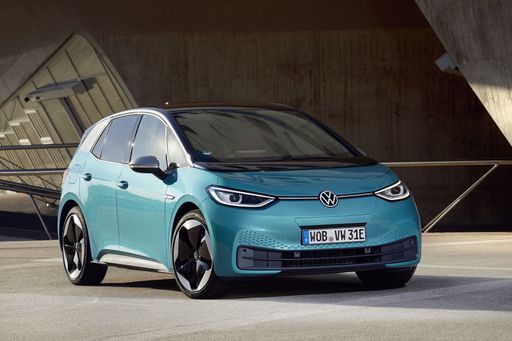 @ Volkswagen
@ Volkswagen
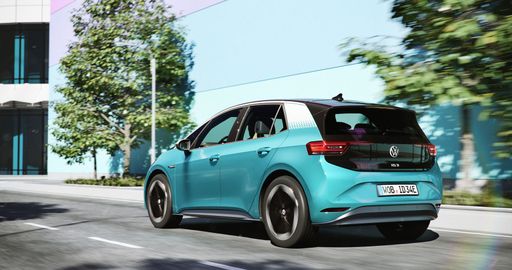 @ Volkswagen
@ Volkswagen
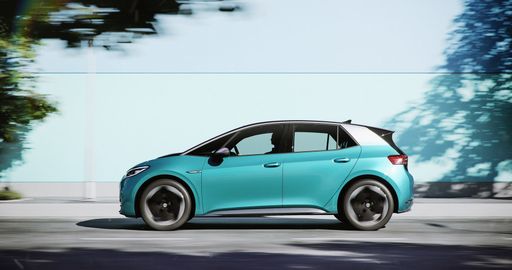 @ Volkswagen
@ Volkswagen
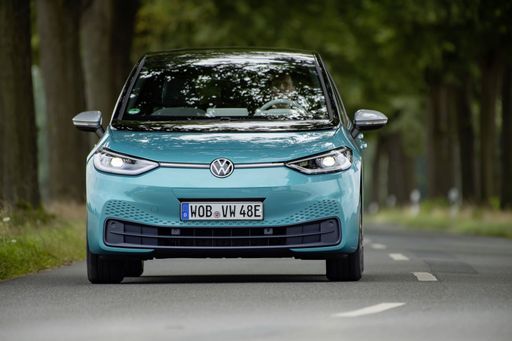 @ Volkswagen
@ Volkswagen
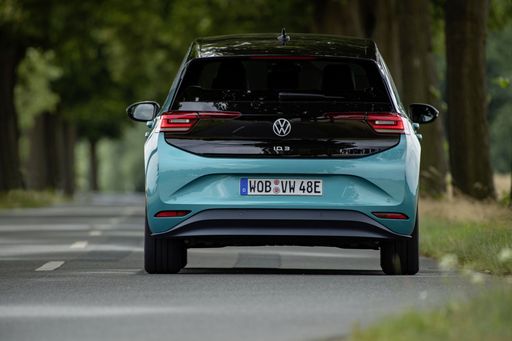 @ Volkswagen
@ Volkswagen
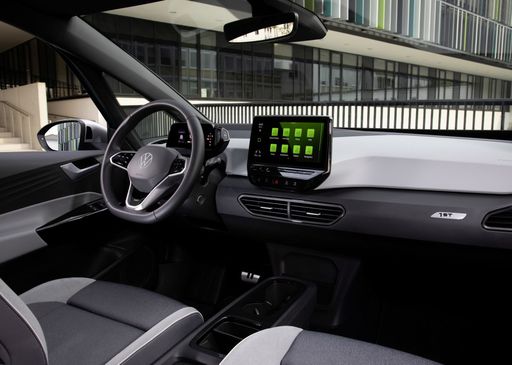 @ Volkswagen
@ Volkswagen
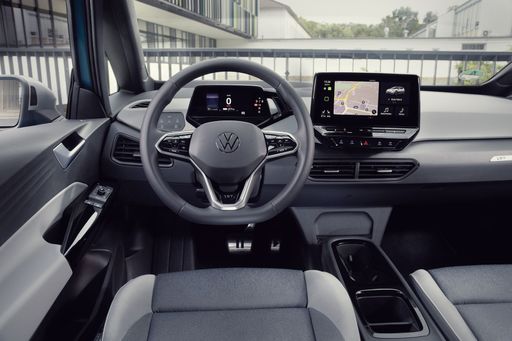 @ Volkswagen
@ Volkswagen
Hyundai Bayon
The Hyundai Bayon is a compact crossover that effortlessly merges practicality with modern design. Its sleek exterior and spacious interior make it an ideal choice for urban settings and longer journeys alike. With a focus on comfort and connectivity, this vehicle provides a smooth driving experience paired with advanced technology features.
details @ hyundai.news
@ hyundai.news
 @ hyundai.news
@ hyundai.news
 @ hyundai.news
@ hyundai.news
 @ hyundai.news
@ hyundai.news
 @ hyundai.news
@ hyundai.news

|

|
|
|
|
Costs and Consumption |
|
|---|---|
|
Price
28600 - 41800 £
|
Price
20100 - 25800 £
|
|
Consumption L/100km
-
|
Consumption L/100km
5.4 - 5.5 L
|
|
Consumption kWh/100km
14.5 - 15.8 kWh
|
Consumption kWh/100km
-
|
|
Electric Range
383 - 606 km
|
Electric Range
-
|
|
Battery Capacity
52 - 79 kWh
|
Battery Capacity
-
|
|
co2
0 g/km
|
co2
124 g/km
|
|
Fuel tank capacity
-
|
Fuel tank capacity
40 L
|
Dimensions and Body |
|
|---|---|
|
Body Type
Hatchback
|
Body Type
SUV
|
|
Seats
5
|
Seats
5
|
|
Doors
5
|
Doors
5
|
|
Curb weight
1787 - 2000 kg
|
Curb weight
1170 - 1195 kg
|
|
Trunk capacity
385 L
|
Trunk capacity
411 L
|
|
Length
4264 mm
|
Length
4180 mm
|
|
Width
1809 mm
|
Width
1775 mm
|
|
Height
1564 mm
|
Height
1500 mm
|
|
Payload
430 - 473 kg
|
Payload
460 - 465 kg
|
Engine and Performance |
|
|---|---|
|
Engine Type
Electric
|
Engine Type
Petrol
|
|
Transmission
Automatic
|
Transmission
Manuel, Automatic
|
|
Transmission Detail
-
|
Transmission Detail
Schaltgetriebe, Automat. Schaltgetriebe (Doppelkupplung)
|
|
Drive Type
Rear-Wheel Drive
|
Drive Type
Front-Wheel Drive
|
|
Power HP
170 - 326 HP
|
Power HP
100 HP
|
|
Acceleration 0-100km/h
5.7 - 8.2 s
|
Acceleration 0-100km/h
11.3 - 12.4 s
|
|
Max Speed
160 - 200 km/h
|
Max Speed
176 - 179 km/h
|
|
Torque
310 - 545 Nm
|
Torque
172 - 200 Nm
|
|
Number of Cylinders
-
|
Number of Cylinders
3
|
|
Power kW
125 - 240 kW
|
Power kW
74 kW
|
|
Engine capacity
-
|
Engine capacity
998 cm3
|
General |
|
|---|---|
|
Model Year
2024
|
Model Year
2024
|
|
CO2 Efficiency Class
A
|
CO2 Efficiency Class
D
|
|
Brand
VW
|
Brand
Hyundai
|
VW ID.3
Introducing the VW ID.3: A New Age of Electric Driving
In the ever-evolving world of electric vehicles, Volkswagen stands as a beacon of innovation and sustainability. The VW ID.3 is the marque’s answer to a cleaner future, presenting a stylish and practical hatchback that captivates the eco-conscious yet demanding motorist. With variations that cater to diverse preferences, the ID.3 sets a new standard in the electric vehicle segment.
Performance & Efficiency: Pure Electric Power
The VW ID.3 offers a dynamic blend of performance and efficiency with power ranging from 170 to 326 PS. This is translated into on-road finesse by its automatic gearbox and rear-wheel drive configuration. Drivers can expect an impressive range between 383 to 604 km on a single charge, thanks to the vehicle’s efficient energy consumption which sits between 14.5 to 15.8 kWh/100km. Catering to various driving styles, it delivers acceleration from 0 to 100 km/h in just 5.7 to 8.2 seconds, all while maintaining zero emissions on the road.
Innovative Technology: Beyond the Basics
Volkswagen has embedded advanced technological features into the ID.3 to enhance user experience. The vehicle boasts a reduction gearbox designed for peak efficiency and seamless driving. It also comes equipped with the latest infotainment systems, a digital cockpit and safety features that elevate both convenience and security to new heights.
Design & Comfort: Spacious and Sleek
With a length of 4264 mm and a width of 1809 mm, the VW ID.3 comfortably accommodates five passengers while offering a generous 385-litre boot capacity. The sleek, streamlined silhouette is complemented by a spacious interior design prioritizing both comfort and sophistication. Crafted for the modern driver, the ID.3 offers features like adaptive ambient lighting and adjustable seating, ensuring a journey as pleasant as the destination.
Environmental Impact: Driving Towards Zero Emissions
Aligned with the target of reducing carbon footprints, the ID.3 performs strongly with a CO2 emission rating of 0 g/km, holding a proud A-class CO2 efficiency rating. By embracing sustainable materials and methods, Volkswagen reduces the life-cycle emissions of the ID.3, making it a hallmark of eco-friendly vehicle innovation.
The Verdict: A Smart Choice
The VW ID.3 represents a critical step forward in the era of electric mobility. With an enticing price range of €36,900 to €52,295, it offers a balance between value, sustainability, and tech-laden driving experience. Whether for city errands or long journeys, the VW ID.3 stands out with its commitment to innovation and environmental stewardship, making it an exemplary choice for today's discerning driver.
Hyundai Bayon
Introducing the Hyundai Bayon: A New Era in Compact SUVs
The Hyundai Bayon, a compact SUV designed with urban adventurers in mind, is making waves with its exceptional blend of style, performance, and technology. The brand has pulled out all the stops to ensure that the Bayon stands out in the crowded SUV market, offering a vehicle that is both practical and innovative.
Sleek Design and Cutting-Edge Aerodynamics
The Bayon features a striking exterior design, characterised by its bold lines and angular shapes. With a length of 4180 mm, a width of 1775 mm, and a height of 1500 mm, the Bayon commands attention with its modern appeal and aerodynamic efficiency. These dimensions not only contribute to its sleek design but also enhance fuel efficiency, achieving an impressive 5.4 L/100 km.
Engine Performance and Specifications
Under the bonnet, the Bayon is powered by a 1.0-litre T-GDI petrol engine, delivering a robust 100 PS or 74 kW. This engine is available with either a manual or automatic gearbox, meeting varied driver preferences. The front-wheel-drive system complements its urban-centric design, ensuring a smooth and responsive ride.
Maximised Interior Space and Comfort
The spacious interior of the Bayon accommodates up to five passengers comfortably. The vehicle boasts a boot space of 411 litres, perfect for both everyday use and weekend getaways. The cabin is designed with practicality and technology in mind, with intuitive controls and ample storage options.
Advanced Technology and Connectivity
Hyundai has equipped the Bayon with state-of-the-art technology to enhance the driving experience. The SUV features a high-resolution touchscreen, offering seamless connectivity with Apple CarPlay and Android Auto. Safety is also a priority, with multiple driver assistance systems including lane-keeping assist and forward collision avoidance assist.
Environmental Efficiency
Despite its powerful performance, the Bayon achieves a respectable CO2 efficiency class of D, with emissions as low as 122 g/km. This balance between performance and environmental responsibility makes the Bayon an attractive option for conscientious drivers.
Affordability and Market Appeal
The Hyundai Bayon is competitively priced, ranging from €22,900 to €29,600. Its affordable running costs, estimated at 32.3 to 36.4 cents per kilometre, further enhance its appeal to budget-conscious consumers. With monthly costs ranging from €806 to €909, the Bayon provides excellent value without compromising on features or performance.
Final Thoughts
The Hyundai Bayon truly stands out in the compact SUV segment, combining style, innovation, and practicality in an appealing package. It offers a versatile driving experience suited to the demands of modern urban living, making it a top contender in its class. As Hyundai continues to champion forward-thinking design and technology, the Bayon is a testament to the company's ongoing commitment to excellence.
The prices and data displayed are estimates based on German list prices and may vary by country. This information is not legally binding.
